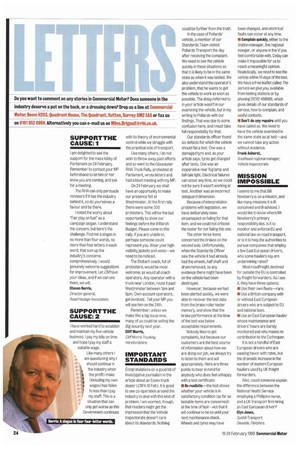IMPORTANT STANDARDS
Page 26

If you've noticed an error in this article please click here to report it so we can fix it.
Congratulations on a good bit of investigative journalism in the article about an Essex truck dealer (CM4-10 Feb). It is good to see co-operation around the industry to deal with this kind of problem. lam worried, though, that readers might get the impression that the Vehicle Inspectorate doesn't care about its standards. Nothing could be further from the truth.
In the case of Pollards' vehicle, a member of our Standards Team visited Pollards Transport the day after receiving the complaint. We need to see the vehicle quickly in these situations so that it is likely to be in the same state as when it was tested. We also understand the operator's problem, that he wants to get the vehicle to work as soon as possible. The delay referred to in your article wasn't in our examining the vehicle, but in my writing to Pollards with our findings. That was due to some confusion here, and I must take full responsibility for that.
Our standards officer found six defects for which the vehicle should fail a test. One was a damaged tyre and, as your article says, tyres get changed after tests. One was an inoperative rear fog lamp and tell-tale light. Electrical failures can occur anytime, so we could not be sure it wasn't working at test. Another was an incorrect sideguard dimension.
Because of interpretation problems with legislation, we have deliberately been circumspect on failing for that item, and we could not criticise the tester for not failing this one.
The other three items concerned the brakes on the second axle. Unfortunately, when the Standards Officer sale the vehicle it had already had the wheels, half shaft and drum removed, so any evidence there might have been on the vehicle had been destroyed.
However, because we had been alerted quickly, we were able to recover the test data from the brake roller tester memory, and show that the brake performance at the time of the test was below acceptable requirements.
Nobody likes to get complaints, but because our customers are the best source of information about how we are doing Our job, we always try to listen to them and act appropriately. Here are three points to bear in mind for anybody who does feel unhappy with a test certificate:
• Be reaistic—the test shows whether your vehicle is in satisfactory condition (as far as testable items are concerned) at the time of test—not that it will continue to be so until your next maintenance check. Wheels and tyres may have
been changed, and electrical faults can occur at any time.
• Complain quicIdy, either to the station manager, the regional manger, or anyone in the VI you feel comfortable with. Delay can make it impossible for us to reach a meaningful opinion. Realistically, we need to see the vehicle within 14 days of the test. We have a free leaflet called The service we give you, available from testing stations or by phoning 01792-458888, which gives details of our standards of service, how to complain, and useful contacts.
• Don't do any repairs until you have called us. We need to have the vehicle examined in the same state as at test—and we cannot take any action without evidence.
Frank Ashurs-t,
Southeast regional manager, Vehicle Inspectorate.
















































































































